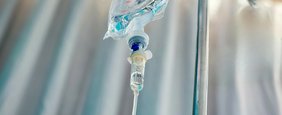
Die Nationale Anti Doping Agentur Deutschland (NADA) weist darauf hin, dass intravenöse Infusionen und/oder Injektionen von insgesamt mehr als 100 ml innerhalb eines Zeitraums von 12 Stunden laut den Regeln der Welt Anti-Doping Agentur (WADA) sowohl im Wettkampf als auch außerhalb von Wettkämpfen verboten sind.
Eine Ausnahme gilt nur für medizinisch notwendige Situationen wie Krankenhausaufenthalte, Operationen oder klinischen diagnostischen Untersuchungen. In diesen Fällen dürfen auch größere Flüssigkeitsvolumina verabreicht werden, sofern die enthaltenen Substanzen nicht verboten sind.
Wenn eine Infusion medizinisch notwendig ist und nicht unter die genannten Ausnahmen fällt, müssen Athletinnen und Athleten – abhängig vom jeweiligen Testpool – entweder im Vorfeld oder im Anschluss an eine Dopingkontrolle eine Medizinische Ausnahmegenehmigung (TUE) beantragen. Diese Genehmigung wird nur erteilt, wenn bestimmte Voraussetzungen erfüllt sind: Es muss eine ärztlich diagnostizierte Erkrankung oder medizinische Notfallsituation vorliegen, die Infusion muss ärztlich verordnet sein und erlaubte Behandlungsalternativen wie beispielsweise die orale Aufnahme (durch den Mund) der Flüssigkeit oder Medikamente ist medizinisch nicht vertretbar oder möglich.
Ebenso ist die Beantragung einer TUE notwendig, wenn verbotene Substanzen als intravenöse Infusion und/oder Injektion verabreicht werden, auch wenn dies im Krankenhaus, bei Operationen oder klinischen diagnostischen Untersuchungen geschieht oder wenn das Flüssigkeitsvolumen unter 100 ml liegt.
Sogenannte Lifestyle-Infusionen, die Vitamine, Mineralstoffe oder Spurenelemente enthalten, erfüllen diese Voraussetzungen nicht. Die NADA warnt zudem davor, dass solche Infusionen – etwa aus Drip-Bars – möglicherweise verbotene Substanzen enthalten können.
Aus diesem Grund rät die NADA grundsätzlich von intravenösen Infusionen ab, die nicht medizinisch notwendig sind.
Mehr Informationen über Infusionen im Sport finden Sie in unserer Broschüre: https://www.nada.de/fileadmin/nada/SERVICE/Downloads/Broschueren/202502_Informationsflyer_der_NADA__Infusionen_im_Sport_.pdf
-- English --
Warning against unauthorised infusions in sport
The National Anti Doping Agency of Germany (NADA Germany) would like to point out that intravenous infusions and/or injections totalling more than 100 ml within a period of 12 hours are prohibited both in competition and out of competition according to the rules of the World Anti-Doping Agency (WADA).
An exception only applies to medically necessary situations such as hospitalisation, operations or clinical diagnostic examinations. In these cases, larger volumes of fluids may also be administered, provided the substances they contain are not prohibited.
If an infusion is medically necessary and does not fall under the exceptions mentioned, athletes must - depending on the respective test pool - apply for a Therapeutic Use Exemption (TUE) either before or after a doping control. This authorisation is only granted if certain requirements are met: There must be a medically diagnosed illness or medical emergency situation, the infusion must be medically prescribed and permitted treatment alternatives such as oral intake (by mouth) of the fluid or medication is not medically justifiable or possible.
It is also necessary to apply for a TUE if prohibited substances are administered as an intravenous infusion and/or injection, even if this is done in hospital, during operations or clinical diagnostic examinations or if the volume of fluid is under 100 ml.
So-called lifestyle infusions containing vitamins, minerals or trace elements do not fulfil these requirements. NADA Germany also warns that such infusions - for example from drip bars - may contain banned substances.
For this reason, NADA Germany generally advises against intravenous infusions that are not medically necessary.
Here you will find further information: https://www.nada.de/en/medicine/current-medical-advice